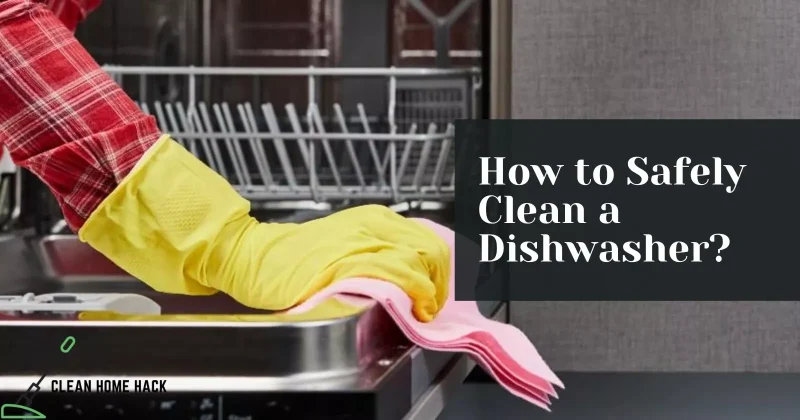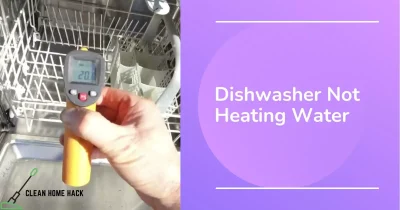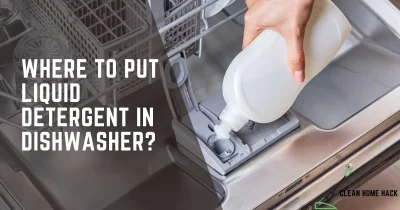How to Safely Clean a Dishwasher? (5 Safety Precautions)

 The Short Answer is: The Short Answer is: |
| To safely clean a dishwasher, you can use vinegar, which is natural and safe to use in your dishwasher. First, empty the dishwasher and remove the filter, utensil holders, and dishwasher racks. Then, place a dishwasher-safe bowl filled with one cup of distilled white vinegar on the top rack and run a hot water cycle. You can also soak the removed parts in a mixture of warm water and vinegar for at least 30 minutes. Finally, clear out any debris and wipe down the interior of the dishwasher with a microfiber cloth. |
If you’re like most people, you probably use your dishwasher on a regular basis to save time and effort when it comes to cleaning dishes. However, it’s important to remember that dishwashers require regular cleaning and maintenance to keep them running efficiently and prevent costly repairs down the line.
In this article, we’ll provide tips on how to safely clean a dishwasher, including how to clean the filter, gasket, and spray arms, and how to properly load your dishes. By following these tips, you can ensure that your dishwasher is performing at its best and keep your dishes sparkling clean.
Table of Contents
Why Regular Cleaning is Important
Regular cleaning of a dishwasher is important to maintain its efficiency and prevent the buildup of grease, soap scum, and food debris that can reduce its effectiveness.
A dirty dishwasher can also be a breeding ground for germs, including drug-resistant bacteria, fungi, and other harmful microorganisms. Regular cleaning can help prevent the buildup of detergent and ensure that the dishwasher is running smoothly.
Cleaning the dishwasher filter and interior walls can prevent bits of food, grease, undissolved detergent, and water minerals from building up and clogging the spray arms.
Neglecting to clean the dishwasher can lead to unpleasant smells, unsightly buildup, and damage to the dishwasher’s filter and pump, which can result in costly repairs.
Therefore, it is recommended to clean the dishwasher every 30 days to keep it free from unpleasant odor, bacteria, and fungi, and to help it run smoothly and maintain its luster.
Safety Precautions Before Cleaning
Cleaning a dishwasher is an important task to maintain its efficiency and hygiene. However, it is important to take some safety precautions before starting the cleaning process. Here are some safety precautions to consider before cleaning a dishwasher:
- Turn off the power: Before starting the cleaning process, make sure to turn off the power supply to the dishwasher. This will prevent any electrical accidents from occurring.
- Wear protective gear: It is recommended to wear protective gloves and goggles to protect your hands and eyes from any harmful chemicals or debris that may be present in the dishwasher.
- Remove any debris: Before cleaning the dishwasher, remove any large debris such as food particles, broken glass, or utensils that may be present in the dishwasher. This will prevent any accidents from occurring during the cleaning process.
- Use safe cleaning products: When cleaning the dishwasher, use safe cleaning products such as vinegar, baking soda, or dish soap. Avoid using harsh chemicals such as bleach or ammonia, as they can damage the dishwasher and pose a health risk.
- Read the manufacturer’s instructions: It is important to read the manufacturer’s instructions before cleaning the dishwasher. This will ensure that you are using the correct cleaning method and products for your dishwasher.
By following these safety precautions, you can safely clean your dishwasher and maintain its efficiency and hygiene.
Step-by-Step Guide to Safely Cleaning Your Dishwasher
Dishwashers are a great convenience in the kitchen, but they need to be cleaned regularly to keep them running efficiently and to prevent bad odors. Cleaning your dishwasher is a simple process that can be done with a few basic supplies.
Here is a step-by-step guide to safely clean your dishwasher:
Step 1: Gather Your Supplies
To clean a dishwasher, you will need the following materials and supplies:
- White vinegar: This is a common ingredient used to clean dishwashers. It helps to remove mineral buildup and disinfect the dishwasher.
- Baking soda: Baking soda is another common ingredient used to clean dishwashers. It helps to remove odors and stains.
- Hot water: Hot water is used to dissolve and remove any buildup or debris in the dishwasher.
- Soft-bristle brush: A soft-bristle brush is used to scrub the interior of the dishwasher, including the spray arm, racks, and walls.
- Toothbrush: A toothbrush can be used to clean hard-to-reach areas, such as the corners and crevices of the dishwasher.
- Toothpicks: Toothpicks can be used to remove any debris or buildup from small crevices or holes in the dishwasher.
- Microfiber cloth: A microfiber cloth can be used to wipe down the exterior of the dishwasher.
- Rubber gloves: Rubber gloves can be worn to protect your hands from any harsh chemicals or hot water used during the cleaning process.
It is important to note that the specific materials and supplies needed may vary depending on the cleaning method used. However, the above list includes some of the most commonly used materials and supplies for cleaning a dishwasher.
Step 2: Remove the Filter, Utensil Holders, and Dishwasher Racks
To clean your dishwasher thoroughly, you need to remove the filter, utensil holders, and dishwasher racks. Some filters simply twist off, but others will require tools to unscrew them.
Take them out and place them in a mixture of warm water and 1 cup of white distilled vinegar. Leave them to soak for at least 30 minutes.
Step 3: Clear Out All Debris
Now that you have a clear view of the dishwasher’s interior, use a toothpick or toothbrush to clear out any debris that has accumulated in the spray arms, nozzles, and other hard-to-reach areas. This will help to ensure that water can flow freely through the dishwasher during the cleaning cycle.
Step 4: Clean the Interior of the Dishwasher
Next, sprinkle a cup of baking soda on the bottom of the dishwasher and run a hot water cycle. This will help to remove any odors and stains from the interior of the dishwasher. You can also use a dishwasher cleaning tablet if you prefer.
Step 5: Clean the Dishwasher Door and Gasket
The door and gasket of the dishwasher can also accumulate dirt and grime over time. Use a toothbrush and warm, soapy water to clean these areas thoroughly. Be sure to rinse the soap off completely to avoid leaving any residue behind.
Step 6: Clean the Dishwasher Exterior
Finally, use a microfiber cloth and warm, soapy water to clean the exterior of the dishwasher. Be sure to wipe down the control panel, buttons, and handle to remove any dirt or grime that has accumulated.
By following these simple steps, you can keep your dishwasher running efficiently and prevent bad odors. Cleaning your dishwasher regularly will also help to extend its lifespan and prevent costly repairs.
Dealing with Tough Stains and Deposits
Dealing with tough stains and deposits is an important part of cleaning a dishwasher. Here are some tips to help you tackle this task:
- Vinegar: One of the easiest and most effective ways to clean a dishwasher is by using vinegar. Simply place a cup of white vinegar in a dishwasher-safe container on the top rack of your empty dishwasher and run a hot water cycle. This will help to remove any build-up and leave your dishwasher smelling fresh.
- Baking soda: For tough stains and deposits, you can also use baking soda. Sprinkle a cup of baking soda on the bottom of your dishwasher and run a hot water cycle. This will help to remove any stubborn stains and leave your dishwasher looking clean and fresh.
- Citric acid: Another effective way to clean a dishwasher is by using citric acid. You can find citric acid in the canning section of most grocery stores. Simply add a tablespoon of citric acid to your dishwasher detergent compartment and run a hot water cycle. This will help to remove any mineral deposits and leave your dishwasher looking clean and shiny.
- Scrubbing: For tough stains and deposits that won’t come off with the above methods, you may need to do some scrubbing. Use a soft-bristled brush or sponge to scrub the affected areas, being careful not to scratch the interior of your dishwasher.
By following these tips, you can safely and effectively clean your dishwasher and keep it running smoothly for years to come.
Maintaining a Clean Dishwasher Routine
Maintaining a clean dishwasher routine is essential to keep your dishwasher functioning efficiently and to prevent the buildup of germs and grime. Here are some tips on how to maintain a clean dishwasher routine:
- Clean the filter: If your dishwasher has a filter, remove it and clean off any food or grime. Food can become trapped in the filter and impair cleaning.
- Clean the door and seals: Dishwashers have seals around the door rim to prevent the machine from leaking while running. Wipe down the rubber seals and the door with a damp cloth to prevent soil and grime from building up. A drop of dish soap will do the trick.
- Clean the spray arm: Wipe down the spray arm with a damp towel. We recommend removing the spray arm to clear any blockages with a toothpick every six months. Refer to your owner’s manual for detailed instructions on how to remove and clean your spray arm.
- Monthly cleaning: Cleaning your dishwasher once a month helps prevent a build-up of germs and maintains your machine’s efficiency.
- Keep it running: Running your dishwasher at least once a week keeps the motor seals working properly. Remember, even small loads can save water with your dishwasher.
Over time, bits of food, grease, undissolved detergent, and water minerals can build up on the dishwasher’s filter and interior walls — and even clog the spray arms. That’s why running regular cleaning cycles and keeping your dishwasher clean are so important.
Aside from the unpleasant smell and unsightly look, this gunk leaves behind, it can also leave spots and film on your glassware, dinnerware, and flatware, no matter how carefully and correctly you load the dishwasher.
Plus, residue buildup can damage the dishwasher’s filter and pump, ultimately resulting in costly repairs. You can deep clean the interior and remove mineral buildup by using vinegar and baking soda or a dishwasher cleaner.
Frequently Asked Questions Related to the Topic:
How often should I clean my dishwasher?
It is recommended to clean your dishwasher once a month to prevent buildup of food particles, grease, and soap scum that can cause unpleasant odors and affect its performance.
What is the best thing to clean the inside of a dishwasher?
It is recommended to clean the dishwasher every 30 days to keep it and your dishes sparkling clean. To clean the inside of a dishwasher, you can use vinegar and baking soda or a dishwasher cleaning tablet.
Regular cleaning of the inside of the dishwasher can help prevent a smelly dishwasher and the buildup of detergent, minerals, and dirt that can cause your dishwasher to not clean properly.
Do I need to disinfect my dishwasher?
Yes, you need to disinfect your dishwasher. Over time, bits of food, grease, undissolved detergent, and water minerals can build up on the dishwasher’s filter and interior walls, and even clog the spray arms.
Up to 74 species of bacteria can be found in a dirty dishwasher, including drug-resistant bacteria that can cause diarrhea and be fatal to immuno-compromised individuals.
To keep your dishwasher smelling fresh and your dishes sparkling clean, it is recommended to run regular cleaning cycles and keep your dishwasher clean.
Conclusion on How to Safely Clean a Dishwasher
In conclusion, cleaning your dishwasher is an important task that should be done regularly to ensure that it functions properly and lasts longer.
One easy and fast method to clean your dishwasher is to fill a dishwasher-safe bowl with 1 cup of white vinegar and put it in the top rack of an empty dishwasher, then set the dishwasher to run.
Another effective and natural method for cleaning your dishwasher is to use vinegar. Vinegar is versatile and eco-friendly, and it can help remove mineral buildup and other debris from your dishwasher.
It is also important to clean the filter regularly, at least once a month, to prevent clogging and ensure proper water circulation. By following these simple steps, you can keep your dishwasher clean and well-maintained, which will help it to function properly and last longer.







